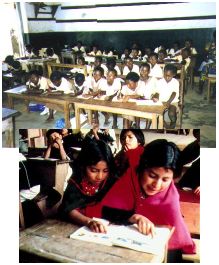Twinning for Inclusion: A Child-to-Child Project in Zambia
Paul Mumba, a teacher at Kabale Primary School in Mpika district, is a co-ordinator of Child-to-Child activities at his school. He spent a number of years preparing pupils for their examinations. Despite the extra time and support his pupils their results did not improve. He found that while the fast learners were benefitting from the extra support, slow learners were continuing to perform poorly. Paul decided to draw upon the Child-to-Child principle of learning through experience by allowing children to conduct their own surveys and experiments to discover answers for themselves. The aim was to encourage independence by creating an environment in which children learn to work together and help each other: “Everyone teaches and everyone learns from one another.” This helped all pupils including slow learners. This eventually led to the group twinning method which formed the basis of the Inclusive Education (IE) project.

Sixteen primary schools are involved in the IE project. Two of the schools have units for children with learning difficulties and hearing impairments. The project is trying out new ideas and strategies relevant to real conditions at home, school and within the community. The aim is to create awareness of IE, to change the community’s attitude to disability and improve educational opportunities for disabled children and other excluded children. A team of teachers and facilitators are trying out the idea of twinning disabled and non-disabled children. The pilot scheme, which is funded by Comic Relief, includes the following:
- Developing teaching and learning materials which allow pupils to explore the issues of disability and inclusion;
- Developing strategies to integrate children in special units into the life of the school;
- Investigating the role of group work in supporting inclusion in the regular classroom;
- Designing simple assessment tests which can be used by children and teachers in their homes and communities.
Child-to-Child was launched in 1978 as preparation for the International Year of the Child in 1979. Central to the Child-to-Child principle is the faith in the power of children to communicate health messages and practices to younger children, peers, families and communities. Children can benefit from being part of this process. The ideas of Child-to-Child are not new. Children have always been important in spreading ideas and practices in their communities.
Twinning
Twinning is an idea developed out of Child-to-Child. Children are natural communicators and mentors. Children are paired so that they can work together and support each other within their schools and communities for inclusion. In Mpika twinning takes place between disabled and non-disabled children. For more information contact: Paul Mumba and Patrick Kangwa at T.S. 17682 . Kabale Primary School . P.O.Box T144 . Mpika . Northern Province-Zambia.
Child-to-Child and Inclusive Education: Welcoming Children with Disabilities into Regular Schools
This is the title of a 3-week course which was held in March 1999 at the Institute of Education, London, UK. The course was developed jointly by the Centre for International Child Health and the Child-to-Child Trust. There were 21 participants from 12 countries, including Ethiopia, Bangladesh, Laos and Nicaragua. The course will be run again in 2000.
“I can already see how my own attitudes have changed towards disability, how my awareness has been raised, and ideas are flowing as to what we CAN do here.” A participant from Pakistan.
For more information about Child-to-Child, contact: Christine Scotchmer . Institute of Education . 20 Bedford Way . London WC1 OAL
Tel: +44 171 612 6648 Fax: +44 171 612 6645
